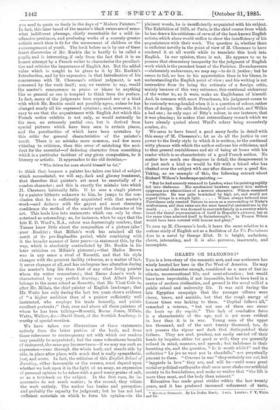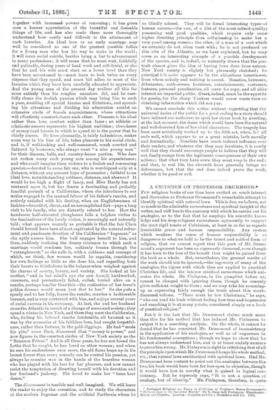HEARTS OR DIAMONDS ?* THIS is a love-story of- the
romantic sort, and our authoress has wisely located her hero in the Far West of America. He-may be a natural-character enough, considered as a man of- fine in- stincts, unconventional life, and semi-education ; but 'would have-been improbable, if not impossible, had he been bred in a -centre of modern civilisation, and -ground in the usual mill of a public school and university life. It was said daring 4he late Egyptian campaign that the younger officers were clever, brave, -and amiable, but that the rough energy of former times was lacking to them. "Capital fellows all," remarked a -veteran, "but not one of --them can swear the boats up the rapids." This -lack of combative force is a characteristic of the age, and is yet -more evident in love than it is in war. Young men of the upper ten thousand, and of the next twenty thousand, too, do not possess -the vigour and dash that distinguished their fathers. They are cool, prudent, not easily carried off-their heads by impulse, either for good or evil ; they are 'generally refined in mind, manners, and speech ; but indolence is their besetting sin, and the question, " Is it worth wIrile P" and the reflection " Le jeu no vaut pas la chandelle," -are -perpetually present to them. "Cravens in war" they certainly are not, but "laggards in love" they are; and will be—until some great social or political earthquake shall once more shake our artificial soeiety to its foundations, and make us realise that " the -life is more than meat, and the body than raiment."
Education, has made great strides within the last-twenty years, and it has produced increased refinement of taste, • Hearts or Diamonds. By Ion Duffna Hardy. 2 vols. London F V. White and Co. together with increased powers of reasoning,; it has given men a keener appreciation of the beautiful and desirable
things of- life, and hasp also made them more thoroughly understand how costly and difficult - is the attainment of such luxuries. An ideal love or an early marriage may well be considered as one of the greatest possible follies for a young man who has his way to make in the world ; it will mean social suicide, besides being a bar to advancement in many professions ; it will mean that he mustwait, faithfully and patiently, during years of hard work and self-denial, or else that he and his wife must start on _a lower level than they
have been accustomed to—must learn to look twice on every sixpence that they spend, and must bid adieu to most of the luxuries which they have been carefully educated to appreciate. And the young man of the present day realises all this far more entirely than his rougher ancestors did, and he care- fully shuns. the foolish passion which may bring him to such a pass, avoiding all special fancies an& flirtations,: and .spread- ing his attentions and' dividing his admiration amidst. an extensive circle of female acquaintances, whose Oil-Retinue will effeotively counterbalance each. other. Pleasure is kiaideal rather than, love, comfort rather- than_ fame; an athletic or.' scholastic success represents his highest ambition ; abundance of money (and leisure in which to spend it) is the power that he chiefly eraves. He lives pleasantly, is fairly industrious, makes some way in his line of life, takes pleasure in his social circle, and is, if well-looking and well-mannered, much courted and flattered by hostesses, who always want "a nice young man" for their dinners, balls,and country-house parties: Who does not reckon many such young men among his acquaintance; and who could imagine them victims to a foolish and consuming passion,—devoted to some fair one, who is worshipped only at a distance; without any present hope of possession ; faithful to an ideal love, notwithstanding coldness, distance, and absence ? It would be too high a flight of fancy, and Miss Hardy has not ventnred upon it, but has drawn a fascinating_ and probably fanciful portrait of a Californian, whom she introduces to our notice engaged in the manual labour of his father's ra,nche, and entirely satisfied with his destiny, when an Englishwoman, of fashion—beautiful, clever, and an accomplished flirt—pays a long visit to his family, who are distantly related to her. How the handsome half-educated ploughman falls a helpless victim to the fascinations of the lovely visitor, is amusingly and naturally told ; what -appears scarcely as probableds that the fair Clara should. herself have been almost captivated by the natural refine- ment. and passionate devotion of the Californian ." Ingomar," as she aptly names-. him.. She half engages herself to hint, an& then, suddenly realising the dreary existence to which such a marriage would condemn her, suddenly breaks, through the "entanglement," as she calls it, with a coldness and courage of Which, we think, few women would be capable, considering, her own feelings as little as she does. his, and regarding both their hearts as thistledown in the balance wherr weighed against the charms of society, luxury, and variety. She looked at his mother, "and in her mind's eye she saw, herself, hardworked, careworn, and prematurely faded, exiled; buried alive on a ranche, perhaps lonelier than this—the realisation of -her lover's golden dreams would mean just that to hers" So she- pute a speedy end to her folly, leaves the rauche, marries-a fashionable baronet, andis very contented with him, and enjoys several years of social success in his. company. At last, she and her husband crossthe Atlantic in search of a change-of sceneanclsoeiety; they spend a winter in New York, and there they meet the 'Californian, who, finding his beloved ranche intolerable, all haunted as it was .bythe memories of his faithless love,- had sought forgetful- ness, rather than fortune, in the gold-diggings. Hahad," made his pile," come East, discovered that "money' is power," and now-figures in the smartest circles- of New-York society as-the " Bonanza -Prince." And in all these years, he has not found the Lethe that he sought, he has loved no other woman; and when he sees his enchautrees once more, the-old flame leaps up in his breast fiercer than ever; scarcely can he control his passion, yet always he remains wax in the hands of the heartless woman who has played with his love for her pleasure; and now cannot resist the temptation of diverting herself with-his devotion and her husband's jealousy. She loved to make her "tame bear dance."
Thadonaueesent is terrible am]- well imagined. We will leave the reader to enjoy the, sensation, and to study the characters of .the modern Ingomar. and the artificial Parthenia whom he so blindly adored. They will be found interesting types,of human nature;—the -one, of a flirt of the most refine& qualityv possessing real good qualities, which require only, some - higher directing principle than self-pleasing•to make her a very pearl among women ; the other, of -a man'of a sort- which- we 'certainly do not often meet with ; he is not produced on this side of the Atlantic, as we have- explained, but he may-
serve as an- interesting example' of a possible development of the species, and is, indeed, so naturally drawn that the por- trait almost gives the idea of having bees- done from nature.
New York society is slightly but pleasantly sketched.; its principal bas -noire appears to be the ubiquitous interviewer,-
from whom nobody and nothing is sacred. Beauties, heiresses,' debutantes,' authoresses, hostesses, entertainments, costumes,' features, personal peculiarities,' all serve' for copy, and all alike, interest an impartial public. Great, indeed, must be the appetite for gossip, for the sharp Yankees mould never waste-time on obtaining information. which diebnot pay) We cannot conclude -this notice without 'regretting that the- universal desire of the rpublic for a good ending-to a story should-
have induced our authoress to spoil her clever book by averting, at the last moment, the-doom which would have been the natural and well-deserved fate of her-chief characters. The tragedy has been most artistically worked up to the fifth act, when, In ! all ends well, which appears to us a great mistake, both morally and dramatically: Novelists have much indirect influence over their readers, and whatever else they may inculcate, it is surely well that they should encourage people to believe that they will not finally escape from the legitimate consequences of their own actions ; that what they have sown- they must reap in the end ; and that, in real life, the eleventh hour generally brings no deliverance, but that the end does indeed prove the work, whether it be-good. or evil.







































 Previous page
Previous page